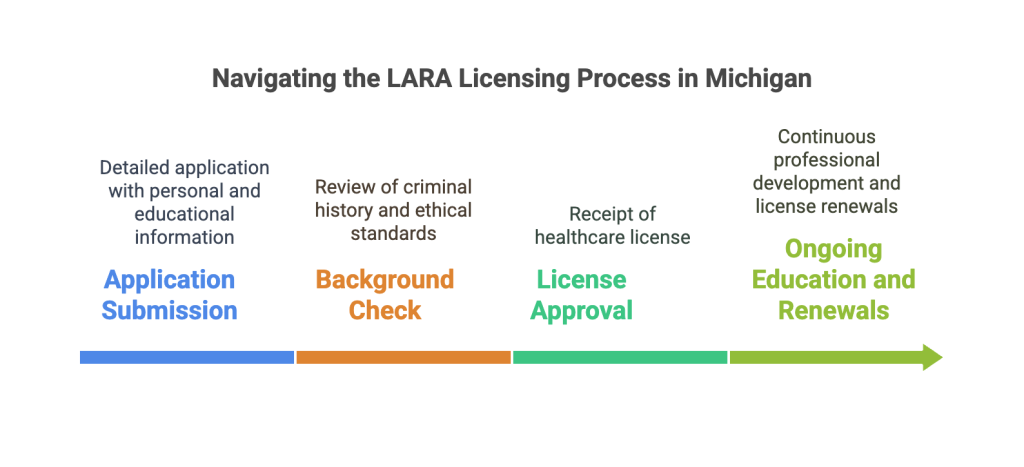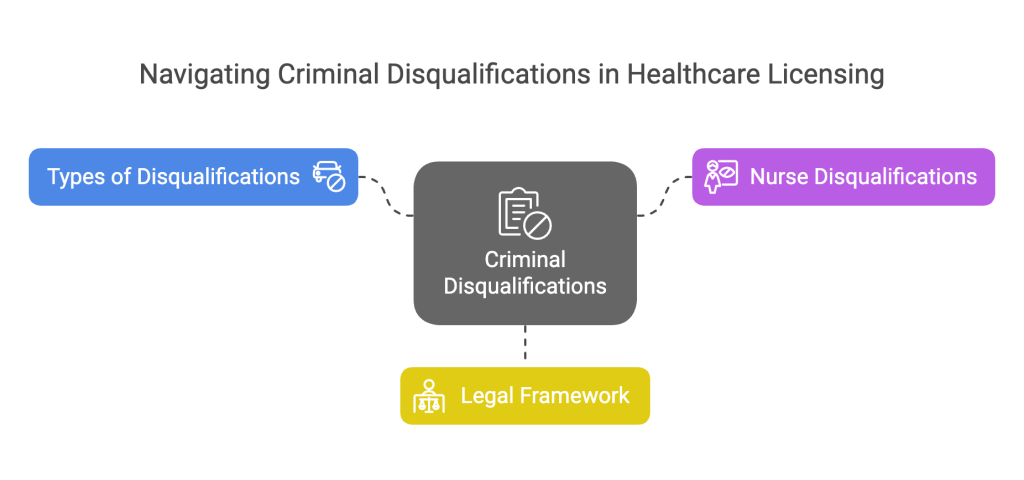Navigating the labyrinth of healthcare licensing in Michigan can be a daunting task, especially when criminal background checks come into play. Whether you're a practitioner looking to start your career in Michigan or a seasoned healthcare professional ensuring your credentials remain in good standing, understanding the licensing process is crucial. This guide will demystify the Michigan healthcare licensing landscape, focusing on LARA's role and how criminal disqualifications factor into background checks.
Key Takeaways
- Michigan's Department of Licensing and Regulatory Affairs (LARA) oversees healthcare licensing by verifying qualifications and conducting background checks.
- Applying for a healthcare license requires submitting personal, educational, and professional documents and undergoing a background check.
- Background checks verify employment, education, and criminal history to ensure only qualified professionals are licensed.
- Certain criminal convictions can disqualify applicants, but there's an option to appeal or demonstrate rehabilitation.
- Accurate records and understanding your rights are crucial in navigating potential disqualifications and securing your license.
Introduction
Healthcare licensing is the gateway to ensuring qualified professionals provide safe and reliable care. In Michigan, this process is overseen by the Department of Licensing and Regulatory Affairs (LARA). Background checks are a key component, as they weed out potential risks and uphold standards. If you're aiming for a healthcare career in Michigan, knowing how these checks work is crucial.
This guide will walk you through Michigan's healthcare background checks, focusing specifically on how LARA handles licensing and deals with criminal disqualifications. You'll learn about the screening process, what to expect, and how a criminal record might impact your application. Understanding this framework will help you navigate the licensing maze with greater confidence.
Understanding LARA: The Licensing and Regulatory Affairs in Michigan
What is LARA?
The Department of Licensing and Regulatory Affairs (LARA) plays a crucial role in Michigan's healthcare sector. It's the state agency responsible for overseeing healthcare licensure. LARA ensures that healthcare professionals meet specific standards before practicing. This involves not only verifying credentials but also conducting extensive background checks. By doing so, LARA maintains high-quality care across the state.
LARA Licensing MI Process
Getting a healthcare license in Michigan involves several steps. First, you need to submit a detailed application. This includes personal information, educational history, and any previous work experience. LARA requires documents proving your qualifications, such as degrees and certifications. Different professions may have specific needs. For example, nurses might need to pass particular exams, while therapists could require additional certifications.

After applying, the background check comes into play. LARA reviews your criminal history, verifying that you meet ethical and professional standards. Any issues here can delay or prevent approval. Once approved, you receive a license, which serves as your entry ticket into Michigan's healthcare field. Remember, maintaining good standing involves ongoing education and periodic license renewals. This continuous process helps ensure that care remains safe and effective for everyone involved.
Michigan Healthcare Background Checks
Background checks in Michigan are a critical part of the healthcare licensing process. They help protect patients and maintain the integrity of the system. When you apply for a license through the Department of Licensing and Regulatory Affairs (LARA), expect a thorough review of your history. This ensures that only qualified and trustworthy professionals are providing care.
Purpose and Importance
Your background check serves multiple purposes. It verifies your employment history, educational credentials, and checks for any criminal records. LARA uses these checks to maintain healthcare standards, ensuring safe and effective patient care. If you're entering the field, this process is essential to your licensure.
Components of a Background Check
A typical healthcare background check includes several components. First, your criminal history is reviewed to flag any felonies or relevant misdemeanors. Employment verification follows, confirming past job positions and tenure. Finally, your academic records are assessed to ensure all qualifications meet Michigan's standards. Each element affects your ability to secure a license, so accuracy and honesty are crucial.
Common Misconceptions
Many believe that minor offenses automatically disqualify candidates, which isn't true. LARA evaluates each situation individually, considering the nature and recency of any infractions. Others worry that any discrepancy can result in denial. While it's important to provide truthful information, honest mistakes can often be rectified by addressing them directly with LARA. For more details about background checks and their implications, resources like the EEOC guidelines offer valuable insights.
Criminal Disqualifications: What You Need to Know
A criminal disqualification can halt your path to a healthcare license in Michigan. It's essential to know what might block your application. Crimes that involve moral turpitude, drug offenses, or violence are primary red flags. The impact isn't just initial; it can affect both obtaining and renewing your license. If you have such a record, your chance at a healthcare career might hit a wall.

For nurses, specific disqualifications apply. Convictions related to patient abuse, theft, or substance abuse can directly affect your ability to practice. Important secondary keywords here are "nurse disqualifications Michigan." Depending on the circumstance, pathways exist to challenge or work around these barriers. Rehabilitation efforts matter, and in some cases, demonstrating change can influence a decision.
Understanding the legal framework is crucial. Federal laws, like those from the EEOC, guide how background checks should be conducted, ensuring fairness. Know your rights. If inaccuracies appear in your results, you have an opportunity to contest them. Professionals have the right to see what employers see, providing a chance to correct or explain findings. Dig into these laws to empower yourself during the process. Check out EEOC guidelines for detailed advice on your rights.
In summary, knowledge of potential disqualifications and your legal rights is your first defense. It allows you to prepare and potentially clear hurdles that may otherwise block your career in healthcare. Be proactive and maintain an understanding of your rights. This empowers you to navigate the challenging licensing landscape.
Steps to Address and Overcome Disqualifications
Navigating disqualifications on your record can feel overwhelming, but understanding your path forward can make a big difference.
Understanding Your Record
First, get a copy of your criminal record. You can request it from the appropriate state agency or use online services. Review it carefully. Look for any errors or outdated information. Even a small mistake can make a difference in your licensure process. If you spot inaccuracies, reach out to the agency that maintains the record to get them corrected. Take a proactive stance in understanding what your record shows and how it aligns with Michigan's regulations.
Petitioning for Reinstatement or Waivers
If you've faced disqualifications, you might have options. Start by petitioning LARA for reconsideration. This process often involves submitting documentation. Make sure it includes evidence of rehabilitation or letters of recommendation if applicable. Some professionals have successfully had disqualifications overturned. While individual results vary, persistence and accurate documentation count.
Understanding these steps and actively working through them can increase your chances of maintaining or obtaining your healthcare license in Michigan. Engage with the process head-on. It's not just about reacting to a disqualification but also about equipping yourself with the knowledge and tools to move forward.
Conclusion
Navigating the landscape of Michigan healthcare licensing with LARA calls for practical engagement and a firm grasp of your rights. Understanding the process is essential for aspiring and current professionals. You've learned how LARA functions, the importance and components of background checks, and how criminal disqualifications can influence your licensing journey.
If you're dealing with disqualifications, know that it's not the end of the road. Familiarize yourself with your criminal record, ensure its accuracy, and explore options for appeal or waiver where possible. Each step requires careful attention, but knowing your rights and available resources equips you to tackle obstacles effectively.
Approaching this process with knowledge and preparation can make a considerable difference. With the right strategy, securing or maintaining your healthcare license in Michigan becomes not just possible, but manageable. Stay informed, remain proactive, and keep your focus on addressing potential barriers with confidence.
Frequently Asked Questions (FAQs)
What crimes disqualify healthcare workers in MI?
In Michigan, healthcare workers can be disqualified for certain criminal offenses. These include convictions for violent crimes, sexual offenses, fraud related to healthcare, and some drug-related crimes.
How long do Michigan nursing checks take?
Background checks for nursing licenses in Michigan usually take between two to four weeks. The exact time can vary depending on the complexity of the background check.
Can a DUI affect a nursing license in MI?
Yes, a DUI can affect your nursing license in Michigan. It might lead to disciplinary actions, suspension, or even revocation of the license, depending on the circumstances.
Does LARA check out-of-state convictions?
Yes, the Michigan Department of Licensing and Regulatory Affairs (LARA) does check for out-of-state convictions as part of the background check process for healthcare workers.
How to appeal a denied healthcare license in MI?
To appeal a denied healthcare license in Michigan, you need to file a request for a hearing within 30 days of receiving the denial notice. This is done through LARA, and it involves presenting your case before an administrative law judge.
Are expunged records visible to LARA?
Expunged records are generally not visible to LARA. However, certain expunged records may still appear in a background check under specific circumstances.
Do MI hospitals require fingerprinting?
Yes, most hospitals in Michigan require fingerprinting as part of the background check process for healthcare employees. This ensures a comprehensive review of your criminal history.
What’s the cost of healthcare checks in Michigan?
The cost of background checks for healthcare positions in Michigan can vary, but typically ranges from $60 to $100. This fee often covers fingerprinting and processing costs.
Can you work in healthcare with a misdemeanor in MI?
Yes, you can work in healthcare with a misdemeanor in Michigan. However, the nature of the misdemeanor and any patterns of behavior may influence hiring decisions.
Does Michigan check the National Practitioner Data Bank?
Yes, Michigan checks the National Practitioner Data Bank (NPDB) during the licensing process to identify any sanctions or adverse actions against healthcare providers.
How often must a healthcare worker in Michigan renew their license?
Healthcare workers in Michigan usually need to renew their licenses every two years. Be sure to check specific requirements for your profession.
What happens if you don't report a conviction to LARA?
Failing to report a conviction to LARA can result in penalties, including fines and potential revocation of your license.
What are the penalties for practicing without a license in MI?
Practicing without a license in Michigan can lead to fines, legal action, and permanent bans from practicing in the state.
Can you reapply for a healthcare license after revocation in MI?
Yes, you can reapply for a healthcare license after revocation in Michigan, but it may require meeting specific conditions and demonstrating changes in behavior.
Definitions
Licensing
Licensing refers to the official process by which the state grants individuals permission to practice a specific profession, such as nursing or physical therapy. In Michigan, the Department of Licensing and Regulatory Affairs (LARA) manages this process. You must meet specific education, training, and ethical standards before receiving a license. It’s your legal entry pass to begin working in healthcare.
Background Check
A background check is a review of a person’s criminal, educational, and employment history. For healthcare applicants in Michigan, this step helps confirm your credentials and identify any past behavior that might raise concerns. LARA uses it to ensure that only qualified, responsible individuals are licensed to provide care.
Disqualification
Disqualification means being legally blocked from obtaining a professional license due to specific reasons—often a criminal conviction. Not all records lead to disqualification, but serious offenses, like assault or fraud, often do. You can sometimes appeal a disqualification or request a review depending on your situation.
Criminal Record
A criminal record is an official list of a person’s arrests and convictions. When you apply for a healthcare license, your record will be evaluated to determine if it affects your ability to work safely and ethically. Minor offenses might be overlooked or forgiven, but serious or recent crimes may delay or prevent your approval.
License Renewal
License renewal is the process of updating and maintaining your authority to work legally in your profession. In healthcare, that typically happens every few years and may involve continuing education or proof of good standing. Missing a renewal deadline or failing to meet requirements could suspend or cancel your license.
References
- Health Care Professional Licensing - State of Michigan
- Michigan Licensing Barriers (NELP Fact Sheet)
- Legal Guide to Exclusions - North Country Community Mental Health

GCheck Editorial Team
Meet the GCheck Editorial Team, your trusted source for insightful and up-to-date information in the world of employment background checks. Committed to delivering the latest trends, best practices, and industry insights, our team is dedicated to keeping you informed.
With a passion for ensuring accuracy, compliance, and efficiency in background screening, we are your go-to experts in the field. Stay tuned for our comprehensive articles, guides, and analysis, designed to empower businesses and individuals with the knowledge they need to make informed decisions.
At GCheck, we're here to guide you through the complexities of background checks, every step of the way.





